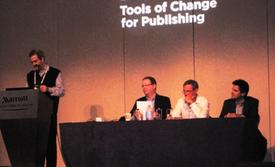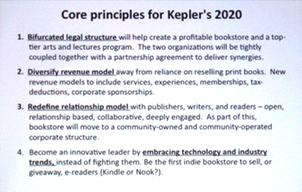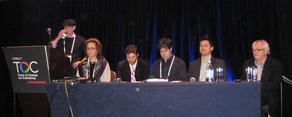 One of the first meat-and-potatoes sessions at this year's O'Reilly Tools of Change conference, "The Changing Face of Retail Bookselling," offered some a stark perspective on the market. Philip Downer, the former CEO of Borders U.K. who now runs a consultancy called Front of Store, observed that 32% of the book purchases in the United Kingdom in 2011 were made online, and that projections suggest that number may climb to as high as 75% by 2020. To complicate matters further, the Tesco's supermarket chain recently announced plans to shrink its physical locations, meaning they'll have less space to sell books--which will have a substantial effect on that nation's mass market sales. Extrapolating from those two trends, he envisioned a future where, as he put it, there would be "nice bookstores for nice people" (in affluent urban and suburban neighborhoods) and no bricks-and-mortar options for the rest of us.
One of the first meat-and-potatoes sessions at this year's O'Reilly Tools of Change conference, "The Changing Face of Retail Bookselling," offered some a stark perspective on the market. Philip Downer, the former CEO of Borders U.K. who now runs a consultancy called Front of Store, observed that 32% of the book purchases in the United Kingdom in 2011 were made online, and that projections suggest that number may climb to as high as 75% by 2020. To complicate matters further, the Tesco's supermarket chain recently announced plans to shrink its physical locations, meaning they'll have less space to sell books--which will have a substantial effect on that nation's mass market sales. Extrapolating from those two trends, he envisioned a future where, as he put it, there would be "nice bookstores for nice people" (in affluent urban and suburban neighborhoods) and no bricks-and-mortar options for the rest of us.
That scenario was worth remembering as Jack McKeown, v-p of business development at Verso Digital, reviewed some of the data from his firm's recent analysis of what's happened to the bookselling market since the collapse of the Borders chain in the United States. (For a full report on those findings, as presented at the Winter Institute last month, click here.) While many former customers had found new places to buy books, including indie bookstores, a significant block of ex-Borders shoppers, he said, are "still in play," not yet having formed new purchasing patterns. To some extent, then, the future of retail bookselling depends on where those potential book buyers land... if, that is, they continue to buy books at all.
McKeown also talked about the possibility that, rather than eroding the market for print books, the rise in e-book sales might actually foster the growth of a "hybrid" market, as e-book buyers were still buying paper editions in roughly equal proportions to their digital counterparts.
 That bit of news seems to be something that Praveen Madan, a partner at San Francisco's Booksmith who recently became a major investor in Kepler's, in nearby Menlo Park, has taken to heart. In a session called "Kepler's 2020: Building the Community Bookstore of the 21st Century," Madan shocked several in the packed room by announcing that he was wide open to partnering with Amazon, even to the point of giving away Kindles through the store. "It's not important for me to make money on every book you buy," he said of his willingness to treat Kepler's as a showroom for books; instead, he was prepared to focus on "making sure you feel comfortable enough to come to Kepler's to buy a printed book when you want a printed book."
That bit of news seems to be something that Praveen Madan, a partner at San Francisco's Booksmith who recently became a major investor in Kepler's, in nearby Menlo Park, has taken to heart. In a session called "Kepler's 2020: Building the Community Bookstore of the 21st Century," Madan shocked several in the packed room by announcing that he was wide open to partnering with Amazon, even to the point of giving away Kindles through the store. "It's not important for me to make money on every book you buy," he said of his willingness to treat Kepler's as a showroom for books; instead, he was prepared to focus on "making sure you feel comfortable enough to come to Kepler's to buy a printed book when you want a printed book."  The strategy was part of Madan's notion that bookstores need to "just let go" of the idea that the majority of their revenue should come from printed book sales; he was prepared to make money by selling literary "experiences" (much as his Berkeley Arts and Letters program had become one of the area's top speaking series) and memberships in the store, transforming Kepler's into a community-owned resource.
The strategy was part of Madan's notion that bookstores need to "just let go" of the idea that the majority of their revenue should come from printed book sales; he was prepared to make money by selling literary "experiences" (much as his Berkeley Arts and Letters program had become one of the area's top speaking series) and memberships in the store, transforming Kepler's into a community-owned resource.
Madan's vision for what Kepler's could become to the community of Menlo Park, Calif., actually echoed the vision that Julie Sandorf of the Charles H. Revson Foundation laid out for public libraries in an afternoon session called "The Library Alternative." Libraries are "our country's last remaining civic square," she said, observing that they had real estate in just about every American community. Librarians are, of course, concerned about the refusal of several major American publishers to sell them e-books, but they are not going to stand idly by. As the Internet Archive's Peter Brantley put it, libraries understand when the tensions between Big Six publishers and Amazon leads to moves like Penguin's breaking off its relationship with Overdrive, a major supplier of e-books to public libraries, because of the ways it provides Kindle users with access to library e-books. "Libraries would like an alternative to Overdrive as well," Brantley said, "but we're not willing to be collateral damage in your fights with others." Should the battle get worse, he warned, "I don't think the average reader has much sympathy for large, foreign-owned publishing conglomerates."
 "There isn't anything a librarian can say to an executive at a Big Six publisher to change his mind about e-lending," warned Publishers Weekly features editor Andrew Albanese, who went so far as to say that the current situation looked like a deliberate attempt by publishers to derail the growing popularity of e-books just long enough to be able to get a handle on a business that had grown well beyond their control (and in some crucial ways without their involvement). The only thing that would change publishers' minds, Albanese continued, was hard data--which is just what Barbara Genco had provided in a keynote address based on a Library Journal survey. Genco began her presentation by reporting that the 9,000-plus public libraries in the U.S. had bought roughly $983 million worth of books in 2011, and that among the core group of "power patrons" who used their libraries on a weekly basis, 61% purchased books by an author they'd previously checked out. As if that clear link between borrowing and buying wasn't enough, Genco added that the percentage was slightly higher for those library patrons who were checking out e-books. As some independent bookstores seek to replicate the public library's community focus, then, it would appear that libraries themselves are actively recognizing their potential as a spur to bookstore purchases.... So one question, perhaps, is where will these two trends meet? --Ron Hogan
"There isn't anything a librarian can say to an executive at a Big Six publisher to change his mind about e-lending," warned Publishers Weekly features editor Andrew Albanese, who went so far as to say that the current situation looked like a deliberate attempt by publishers to derail the growing popularity of e-books just long enough to be able to get a handle on a business that had grown well beyond their control (and in some crucial ways without their involvement). The only thing that would change publishers' minds, Albanese continued, was hard data--which is just what Barbara Genco had provided in a keynote address based on a Library Journal survey. Genco began her presentation by reporting that the 9,000-plus public libraries in the U.S. had bought roughly $983 million worth of books in 2011, and that among the core group of "power patrons" who used their libraries on a weekly basis, 61% purchased books by an author they'd previously checked out. As if that clear link between borrowing and buying wasn't enough, Genco added that the percentage was slightly higher for those library patrons who were checking out e-books. As some independent bookstores seek to replicate the public library's community focus, then, it would appear that libraries themselves are actively recognizing their potential as a spur to bookstore purchases.... So one question, perhaps, is where will these two trends meet? --Ron Hogan

